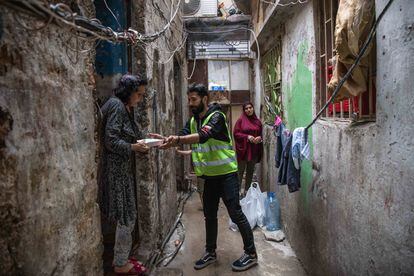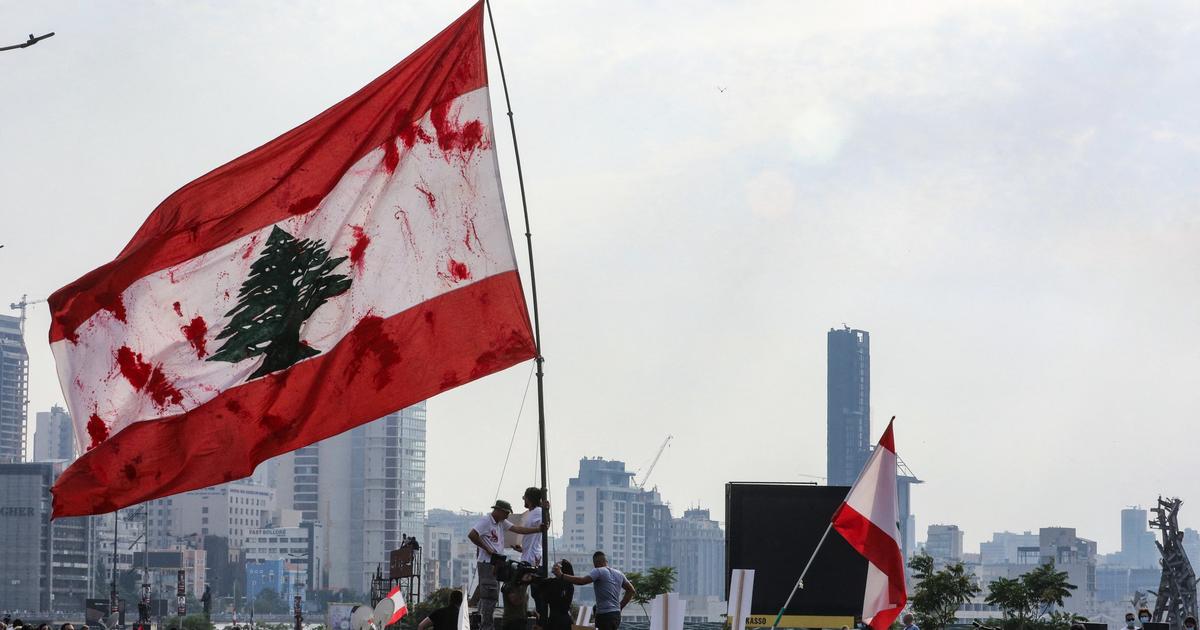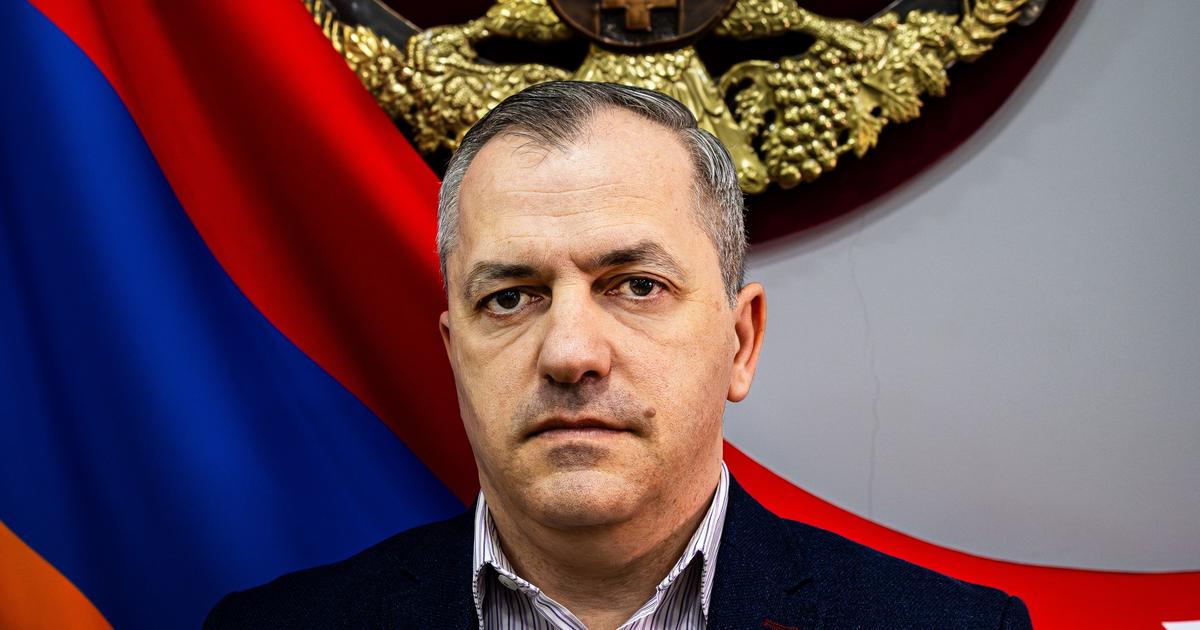Khadija Fares and her husband live in a stark two-room apartment without windows, running water or electricity in the impoverished Bab el Tebeneh neighborhood in the northern Lebanese city of Tripoli, the second largest city in the country. In the absence of light, the refrigerator has become a closet. The collective bathroom is located outside the house. Several sofas patched countless times, two black and white portraits and a mattress are all the furniture they have. Accustomed to living in poverty, the economic crisis today puts this couple on the ropes. At 70, the marriage can be seen on the street. After more than half a century living here for rent, the landlord wants to throw them out to change the old rental contract.
These are just two of those affected of that 55% of the 4.5 million Lebanese (not counting 1.5 million Syrian refugees) that the brutal financial crisis has plunged below the poverty line, according to a Bank calculation World.
In Tripoli, eight out of 10 residents move around that fine line of survival.
No sign of government help;
Only members of the traditional parties, divided by confessions, come to this neighborhood of Bab el Tebeneh to distribute aid to their followers, and some associations recently created by civil society that finance the Lebanese diaspora.
Inside the house of Khadija Fares in the impoverished Bab el Tebeneh neighborhood of Tripoli.
Natalia Sancha Garcia
"The economic crisis the country is going through is more pressing than the one experienced during the civil war [1975-1990]," says Lebanese economist Alia Moubayed from Beirut. “At the time, banks and state services were still operating in a large part of the country where there were no confrontations. Today the crisis hits everyone and everywhere ”, he highlights.
The crisis was already hitting Lebanese society in 2019, when the announcement of a fee for the use of WhatsApp unleashed a wave of protests in which protesters demanded reforms and the departure of the political and economic elite that has been in power for three decades. . But the outbreak of the pandemic has progressively silenced the protests and Lebanon has accelerated its vertiginous free fall: the Lebanese pound has lost 80% of its value against the dollar, hyperinflation exceeds 150% in the price of basic products, banks they have imposed an informal capital control, limiting the monthly money that Lebanese can withdraw from their accounts, and the government has declared the first debt default in its history. Five different types of exchange coexist on Lebanese streets; range from 1.500 pounds to the dollar set by the Central Bank at 13,000 for informal money changers.
The pandemic has deepened the economic crisis, to which was added the explosion on August 4 of a deposit with 2,700 tons of ammonium nitrate in the port of Beirut, a tragedy that caused 211 deaths, more than 6,500 injured and 350,000 displaced of their houses, and that gave the final blow to the divorce of the population and the political class.
Nine months later, the investigation remains paralyzed after targeting members of that political elite who have failed to address the reforms that the country needs as responsible for negligence.
The same one that is now also accused of illegally transferring its fortunes abroad.
More information
A decade of precariousness for Syrian refugees in Lebanon
Lebanon, portrait of a revolution
Acting Prime Minister Hasan Diab resigned the day after the tragedy. However, the formation of a new government remains paralyzed and with it the necessary reforms, a condition for unlocking international aid and avoiding a total collapse of the Lebanese economy. "There will not be a recovery if the culture of impunity imposed by sectarian leaders who have established a clientelist system and co-opted state resources is not ended beforehand," says Moubayed.
"May Allah protect us when state aid ends," says Fátima S. (who prefers not to reveal her last name), in the Tripolitan neighborhood of Zouqat Roumane, in the face of repeated warnings of a near end to the subsidies for bread or oil .
He lives in a labyrinth of underground houses and alleys barely a meter wide lit by street lamps and in which the drains spit a cloudy and smelly liquid on the concrete that he steps on.
There, the local association Los Guardianes de la Ciudad distributes 200 daily hot dishes at
iftar
time.
, breaking of the Muslim fast in the month of Ramadan.
Mohamed Choub, founder of this NGO, assures that the funds come from the Lebanese diaspora.
A community abroad that already doubles the number of inhabitants left in the country and that would exceed four million.
Volunteers from the Lebanese NGO City Guardians distributed hot food to 200 underprivileged families in Tripoli at the time of iftar, the breaking of the Muslim fast at the end of April.Natalia Sancha García
Hundreds of young volunteers joined this NGO in 2015, when a crisis in state garbage management flooded Lebanese streets with mountains of waste, sparking popular outrage.
Those same young people later joined the
2019
zaura
(“revolution” in Arabic) and are the backbone of a myriad of non-denominational civil associations.
In this world built under the floor of a mosque, the inhabitants do not have health insurance or income to pay, for example, for the dialysis that Ghazal, a shy eight-year-old girl with turquoise eyes, needs. In the past, political parties, "especially in times of elections or armed clashes, distributed aid in exchange for votes," a neighbor intervenes, adding: "Now, not even that." In the neighborhood of Zouqat Roumane, a Sunni stronghold, posters of armed youths killed during decades of sectarian fighting in the country share a wall with those of the
Zaim
, feudal leaders whose faces have been bored or scribbled.
With the coffers empty even in those parties, the aid organizations that have sprung up during the protests are the last lifeline for the most vulnerable.
"It is not charity that is going to get us out of this, but jobs", ditch, however, this neighbor of the neighborhood.
Emigration and remittances
Many Lebanese survive on remittances from emigrants, which amounted to some 5.8 billion euros in 2019, although experts estimate that they now amount to half.
The economist Alia Moubayed warns that "the crisis has uncovered a failed system of patronage and patronage that, paradoxically, its own architects can use to their advantage by instrumentalizing growing poverty to reinforce that same system of dependency."
In this crisis situation, many try to leave.
Lebanon does not offer official emigration data, but the local press cites calculations from the MacroTrends website, which estimates that the migratory balance is not only negative, but has increased by around 47% compared to 2019.
"Month after month, the best doctors leave me, the most trained and necessary," complains Mustafa Alloush, chief of surgery at the Nini hospital in Tripoli.
A former deputy, he is also vice president of the Sunni El Futuro party, led by Saad Hariri, called to be prime minister in a government that has not just been established.
"We can no longer even import machinery or even basic accessories due to the lack of foreign exchange," adds this 63-year-old doctor in a country that until this year offered the best health services in the region.
"We can no longer even import machinery or even basic accessories due to the lack of divisions," laments this 63-year-old doctor in a country that until this year offered the best health services in the region.
The remaining foreign exchange, estimated by the Central Bank at 14,100 million euros, will be exhausted, according to experts, in six months or a year, which will end state subsidies.
Queues at gas stations and pharmacies multiply as the pound devalues and products become scarce.
Like many others, Alloush sees an outbreak of violence as inevitable: "We already experienced it in the civil war, when they forced us to operate on an insolvent patient by targeting us with a Kalashnikov."
Activist Eman Ibrahim poses at Cafe Warshe 13 in Tripoli's Al Mina Christian neighborhood at the end of April.
Natalia Sancha Garcia
As the young trained leave the country, "those who remain have a very difficult time finding work due to lack of qualification," laments the surgeon. Jamil Ali, 21, is one of them; With no other job options than picking up cardboard in a popular neighborhood in Tripoli, on a good day he earns three euros, collapsing his back. Like other neighbors his age, he looks to Turkey, a new beacon for the Sunni population of this metropolis and the only destination where they do not require a visa and can open "a bank account without difficulties."
Those who can afford a social conscience also want to leave.
The flag of a political party on the coffin of one of the victims of the Beirut explosion consumed the last bit of rebellious energy that was left to the activist Eman Ibrahim, 26 years old.
"That day I told myself that there is no possible change in a country whose people continue to praise the same parties that kill their citizens," he reflects at the Warshe 13 cafe in the Christian Al Mina neighborhood of Tripoli.
The university student Mira Sukkari poses with her brother at the Wood nightclub in the Christian neighborhood of Al Mina, in Tripoli.Natalia Sancha García
He belongs to the post-war generation, but already at the age of 13 he learned the trauma of the armed sectarian confrontation in the Alawite neighborhood of Jebel al Mohsen. “I am slowly dying in this country. I consume myself in an attempt to change an unalterable system, ”he says. She led feminist marches during the first months of the 2019 protests and today she works in an NGO with young people on gender and conflict resolution programs. "We women fight multiple battles in this patriarchal and sectarian society," she says resignedly before dealing with a "macho father" at home who supports with his salary.
A few meters from this café, the university student Mira Al Sukkari dances to the rhythm of techno music in an empty nightclub that had just opened in times of the pandemic and Ramadan. As the country is on the way to disintegration, the Lebanese youth, expelled from the labor market and the political sphere, are looking for new spaces where they can feel alive. The day of the Beirut explosion also marked his life. He survived the shock wave that devastated the apartment he rented in the Gemeyze neighborhood, one of the most affected. However, this Criminology student has not returned to the university since then because she does not see herself psychologically capable of returning to "that place."









